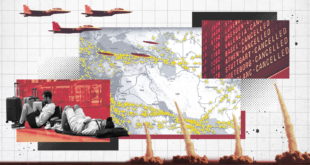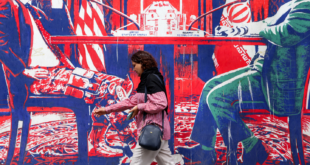 Iran said that new UN sanctions would torpedo renewed nuclear inspections but the United States and its allies are still insistent on imposing a third round of sanctions against Tehran. In Washington, the US State Department said the six major countries working to resolve Iran’s nuclear issue will discuss a draft UN sanctions text September 21 in the US capital.
Iran said that new UN sanctions would torpedo renewed nuclear inspections but the United States and its allies are still insistent on imposing a third round of sanctions against Tehran. In Washington, the US State Department said the six major countries working to resolve Iran’s nuclear issue will discuss a draft UN sanctions text September 21 in the US capital.
In Vienna, Gregory Schulte, US ambassador to the International Atomic Energy Agency, repeated concern at an IAEA meeting that Iran could be using a timetable for cooperation with the agency as a delaying tactic to avoid a third round of UN Security Council sanctions.
But Iranian ambassador Ali Asghar Soltanieh said, “Let the IAEA do its job,” in comments to reporters after a meeting of the Vienna-based IAEA’s 35-nation board of governors.
In a reference to sanctions, Soltanieh said, “Any interference or politically motivated interference will definitely jeopardize the new constructive trend.”
Iran’s top nuclear negotiator Ali Larijani warned in Tehran that its current policy of increased cooperation with the IAEA would be “in danger” if new sanctions were imposed.
But Schulte told the board meeting that while the new inspections were “a potentially important development … Iran is still not complying with the other core requirement for suspension” of uranium enrichment, which makes nuclear power reactor fuel and which Tehran says is its inalienable right as a signatory to the Non-Proliferation Treaty (NPT).
The Security Council has imposed two rounds of sanctions on Iran to get it to stop enriching uranium.
Schulte said the IAEA board should give “active support … for a new sanctions resolution against Iran.”
French ambassador Francois Xavier Deniau told AFP that if Iran does not suspend enrichment “we want new sanctions to be adopted by the Security Council.”
German ambassador Klaus-Peter Gottwald, who addressed the board on behalf of EU nuclear negotiators Britain, Germany and France, said, “We urge Iran to suspend its enrichment-related and reprocessing activities to allow for negotiations.”
But Soltanieh said he wants the Iranian issue handled at the Vienna-based IAEA rather than at the Security Council.
The IAEA board discussed a report from agency chief Mohamed ElBaradei which says Iran is cooperating with the UN nuclear watchdog in providing explicit answers to the existing misunderstandings and ambiguities..
The report included the timetable which the IAEA agreed in August for new inspections to answer unresolved questions from an agency investigation which began in February 2003.
Iran maintains that its nuclear program is aimed at generating electricity but the United States accuses Tehran of using it to hide work on developing atomic weapons.
Iran is not looking to develop nuclear weapons, President Mahmoud Ahmadinejad told Britain’s Channel 4 News Wednesday.
But ElBaradei said the “ball is very much in the Iranian court,” now that it has promised cooperation to resolve outstanding issues.
“We will be able in two to three months to see whether Iran is, in fact, implementing, in good faith, that Work Plan,” for inspections, ElBaradei said.
He answered US and European criticism that the timetable settles one issue at a time, instead of tackling all of them simultaneously, saying that although he did not like the “sequencing” it was better than having no cooperation at all.
Soltanieh, meanwhile, assured reporters that Iran would not limit questions from the IAEA to the timetable.
“Of course if there are questions, we will be happy and prepared to answer the questions,” Soltanieh said.
“I am encouraged that the international community is supporting our efforts,” ElBaradei said.
ElBaradei repeated his proposal for a “time-out” in which Iran would suspend enrichment and the UN would suspend sanctions.
Iran has repeatedly announced that it does not accept the time-out plan.
 Eurasia Press & News
Eurasia Press & News


